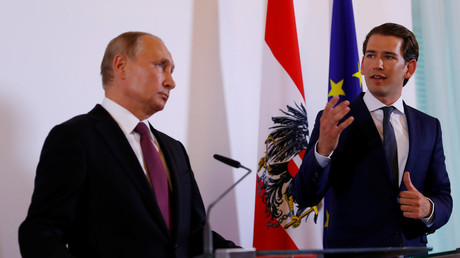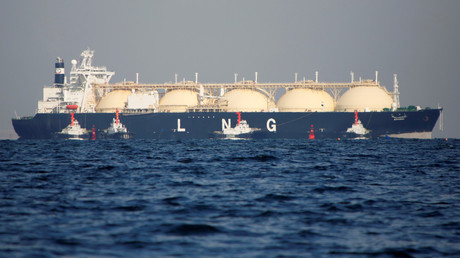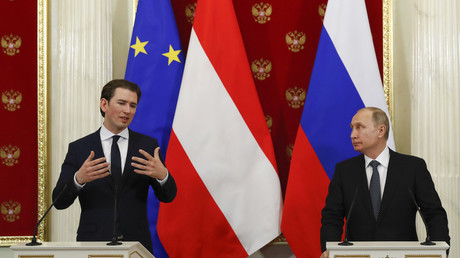Pragmatics win: Kurz to meet Putin for 4th time this year to strengthen ties & foster dialogue
Austrian Chancellor Sebastian Kurz is set to meet President Vladimir Putin this week, their fourth meeting this year, displaying the pragmatic politics that are so badly needed right now in relations between Moscow and Europe.
Kurz is scheduled to make his second visit to Russia in less than a year and is expected to meet with Putin in St. Petersburg on Wednesday as part of a working trip. It will be the fourth meeting between the two leaders in less than nine months. Such frequent contacts have brought the already constructive and cordial relations between the two nations to a seemingly unprecedented level.
How these continue to improve might seem even more unusual against the backdrop of the ongoing cooling in relations between Moscow and the West, which has brought contacts between Russia and Europe to lows that are, at times, comparable with the Cold War era.
Austria’s distinct approach to dealing with Russia has, so far, stood in stark contrast to that of other Western European nations, and are a sign of its cherished political neutrality and non-ideological approach to foreign policy.
‘Mature partnership’
Moscow and Vienna have sought to keep their bilateral ties level-headed through all the turbulent years following Russia’s re-unification with Crimea and the breakout of the Ukrainian crisis. Even though Austria joined anti-Russian sanctions, it repeatedly called for their lifting, pointing out that the restrictions are senseless. Vienna has also repeatedly referred to Moscow as an important international player that should not be neglected.
Kurz has called Russia a “superpower” at least twice this year, adding that Moscow “has an important role in Syria and eastern Ukraine, and Russia has great responsibility” and is capable of helping to achieve peace and stability in many troubled parts of the world. Unlike other European nations, such as the UK or Poland, which has been recently stirring up anti-Russian hysteria by speculating on a perceived ‘Russian threat,’ Austria tends to refer to Russia as a partner in dialogue, while maintaining the importance of communication.
Moscow also sets a high value on its good relations with the small Alpine nation. In April, Putin said that “Russia highly appreciates Austria’s permanent neutrality policy [and] its balanced stance on the topical issues on the European and global agenda.” Austria was the first European country Putin visited in the summer of 2014, following the dramatic events in Ukraine that put a strain on relations between Russia and Europe.
Seizing economic opportunities & ‘working for the long run’
In this week’s meeting, the two leaders are expected to discuss the “future of bilateral relations as well as pressing international and regional issues,” a statement published by the Kremlin ahead of the Austrian Chancellor’s visit says. The “ambitious” bilateral agenda is also expected to be dominated by the buildup of economic ties, according to Russian media.
Economic ties between the two nations seem to be already recovering. In the first seven months of 2018, trade turnover between Russia and Austria grew by 70 percent. In 2017, this growth amounted to 40 percent. Austria’s cumulative investment in the Russian economy accounted for $24 billion, the Russian ambassador to Austria, Dmitry Lyublinsky, told RIA news agency, adding that the two nations are gradually overcoming the economic downturn in bilateral relations caused by the sanctions.
Moscow and Vienna also show no signs of letting up. “Both our countries are … strongly determined to enhance cooperation in various fields … in economy and energy industry in particular,” Lyublinsky said. In June, Russia’s energy giant Gazprom struck a deal with Austria’s OMV energy company on long-term gas supplies, covering the period up to 2040. Since the start of 2018, the volume of Russian gas supplies to Austria has already grown by more than 50 percent, compared with the same period in 2017.
Many Austrian companies are also partially moving their production to Russia seeking to keep their share of the local market and providing Russia with foreign investments. The Austrian businesses fear that the protracted sanctions war could lead to a “point of no return” when the place of the western companies on the Russian market would be taken by competitors, particularly from Asia, Lyublinsky explained.
Austria seeks to seize the existing economic opportunities while its diplomats “strive to do their work for the long run, the ambassador told RIA, adding that no Austrian company has left the Russian market so far. “That shows the far-sightedness of their general strategy,” he added.
Moving dialogue forward
Bilateral ties, important as they may be, will not be the only issue at the talks between Putin and Kurz. The two leaders will also touch upon most international problems, such as conflicts in Syria and Ukraine, as well as discussing the state of Russia’s relations with Europe, which have been strained lately.
“Vienna is an important partner within the EU for our country,” Lyublinsky said, adding that Moscow “values” Austria’s “pragmatic and far-sighted stance” on many international issues. He added that finding “new ways to move forward” in relations between Russia and Europe would be “one of the most important aspects of the forthcoming meeting.”
Austria has long played a role as self-styled mediator and a “bridge-builder” between the western and eastern parts of Europe. The government, which once described itself as “pro-EU” and sought to maintain level-headed ties with Europe’s heavyweight, Germany’s Angela Merkel, also keeps close ties with such countries as Hungary, which has been in dispute with Brussels over the migration and its internal policies.
Vienna took over the lead in the EU for six months in July. Its consistent contacts with Moscow might be an indicator of its desire to play the role of a “bridge-builder” in relations between Russia and Europe as well. Sanctions, mutual accusations and ideological differences have reduced the normal dialogue between Russia and the EU to a minimum, giving Austria an opportunity to fill the void left in the absence of such a mediator, which other European nations are apparently reluctant to take.
“Our Austrian partners were very specific about their interest in restoring a normal working atmosphere in [relations] between the EU and Russia,” Lyublinsky said, adding that “Russia is ready to do it as well.”
If you like this story, share it with a friend!








Comments are closed.